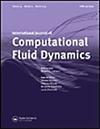Fluid Flow Modelling Using Physics-Informed Convolutional Neural Network in Parametrised Domains
IF 1.1
4区 工程技术
Q4 MECHANICS
International Journal of Computational Fluid Dynamics
Pub Date : 2023-01-02
DOI:10.1080/10618562.2023.2260763
引用次数: 0
Abstract
AbstractWe design and implement a physics-informed convolutional neural network (CNN) to solve fluid flow problems on a parametrised domain. The goal is to compare the effectiveness of training based solely on CFD-generated training data with purely physics-informed training and training based on a combination of both. We consider the problem of incompressible fluid flow in a convergent-divergent channel with variable wall shape. A speciality of the designed neural network is the incorporation of the boundary condition directly in the CNN. A physics-informed CNN that uses a non-Cartesian mesh poses a challenge when evaluating partial derivatives. We propose a gradient layer that approximates the first and second partial derivatives by finite differences using Lagrange interpolation. Our analysis shows that the convergence of purely physics-informed training is slow. However, using a small training dataset in combination with physics-informed training can achieve results comparable to physics-uninformed training with a considerably larger training dataset.Keywords: Physics-informed neural networkconvolutional neural networkU-Netincompressible fluid flowfluid dynamics Disclosure statementNo potential conflict of interest was reported by the author(s).Additional informationFundingThis research is supported by project GA21-31457S ‘Fast flow-field prediction using deep neural networks for solving fluid-structure interaction problems’ of the Grant Agency of the Czech Republic.在参数化域使用物理信息卷积神经网络的流体流动建模
摘要设计并实现了一种基于物理信息的卷积神经网络(CNN),用于求解参数化域上的流体流动问题。我们的目标是比较单纯基于cfd生成的训练数据与纯粹基于物理的训练以及基于两者结合的训练的有效性。考虑变壁形收敛发散通道中不可压缩流体的流动问题。所设计的神经网络的一个特点是将边界条件直接引入到CNN中。在计算偏导数时,使用非笛卡尔网格的物理学CNN提出了一个挑战。我们提出了一个梯度层,利用拉格朗日插值的有限差分近似一阶和二阶偏导数。我们的分析表明,纯物理知识训练的趋同是缓慢的。然而,将一个小的训练数据集与物理信息训练相结合,可以获得与使用一个相当大的训练数据集进行物理信息训练相当的结果。关键词:物理信息神经网络卷积神经网络不可压缩流体流动流体动力学披露声明作者未报告潜在利益冲突。本研究得到捷克共和国资助局GA21-31457S项目“利用深度神经网络快速预测流固耦合问题”的支持。
本文章由计算机程序翻译,如有差异,请以英文原文为准。
求助全文
约1分钟内获得全文
求助全文
来源期刊
CiteScore
2.70
自引率
7.70%
发文量
25
审稿时长
3 months
期刊介绍:
The International Journal of Computational Fluid Dynamics publishes innovative CFD research, both fundamental and applied, with applications in a wide variety of fields.
The Journal emphasizes accurate predictive tools for 3D flow analysis and design, and those promoting a deeper understanding of the physics of 3D fluid motion. Relevant and innovative practical and industrial 3D applications, as well as those of an interdisciplinary nature, are encouraged.

 求助内容:
求助内容: 应助结果提醒方式:
应助结果提醒方式:


